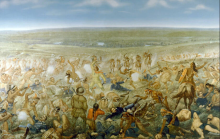The Armenian Genocide is a haunting chapter in human history, marked by the deliberate and systematic extermination of the Armenian population by the Ottoman Empire during World War I. This article delves into the historical context, events leading up to the genocide, and its long-lasting impact.
The Prelude to Tragedy
The roots of the Armenian Genocide can be traced back to the late 19th century when the Ottoman Empire was in decline. Armenians, primarily Christians, were a minority in a predominantly Muslim empire. Tensions between these communities, coupled with nationalist fervor, set the stage for catastrophe. During World War I, the Ottoman government began a brutal campaign against its Armenian citizens, accusing them of collaborating with the enemy. In 1915, they initiated mass deportations and massacres, resulting in the deaths of an estimated 1.5 million Armenians.
Legacy and Recognition
The Armenian Genocide remains a contentious issue today. Turkey, the successor to the Ottoman Empire, denies the genocide label, calling it a consequence of war. However, numerous countries and scholars recognize it as genocide. The genocide has left an indelible mark on the Armenian diaspora, shaping their identity and fueling calls for acknowledgment and justice.
Conclusion
The Armenian Genocide is a stark reminder of the horrors of ethnic cleansing and the consequences of denial. Recognizing this tragedy is crucial for understanding historical injustices and fostering reconciliation.
